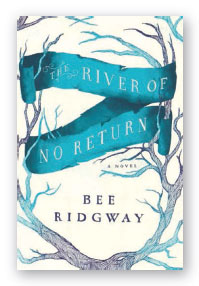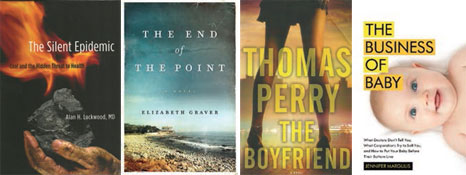
The River of No Return
by Bee Ridgway, PhD ’03 (Dutton)
ick Davenant, an aristocrat in Wellington’s army, jumps forward in time from a battlefield in 1812 to 2003, where he meets a secret society known as the Guild, which controls time travel. In 1815, the Guild enlists Nick to return to his former life to fight against a rival group, the Ofan. Nick’s neighbor, Julia Percy, discovers the ability to manipulate time. They join forces to solve the mystery behind the Guild, the Ofan, and a force from the future that threatens to put a stop to time.
The Silent Epidemic by Alan H. Lockwood ’65, MD ’69 (MIT). Almost half of the energy used to generate electricity in the U.S. comes from burning coal, but that energy comes at a price. “Too few of us are aware of the relationship between coal and health,” writes Lockwood, an emeritus professor of neurology at the University at Buffalo. “The evidence linking coal and disease is strong and getting stronger each year.” He documents the effects of coal pollution on the respiratory, cardiovascular, and nervous systems, explores coal’s impact on climate, and discusses the policy implications for the future.
The End of the Point by Elizabeth Graver, PhD ’92 (Harper). Graver’s elegiac fourth novel chronicles the lives of the Porter family from 1942 to 1999. For the Porters, Ashaunt Point, on Massachusetts’s Buzzards Bay, is more than just a place to spend summer holidays. Helen and her siblings live in a childhood idyll, but the death of her brother in combat during World War II shatters that quiet image. Years later Helen tries to restore Ashaunt’s sense of refuge, yet the social upheavals of the Vietnam War, encroaching development, and an oil spill threaten to destroy her fragile world.
The Boyfriend by Thomas Perry ’69 (Mysterious Press). Jack Till, a retired LAPD homicide detective, works routine cases as a private investigator until the parents of a murdered young woman ask for his help. The police seem uninterested in the woman’s case because she had worked as a high-class prostitute. Till discovers that several women in different cities were killed in the same way, and, like his clients’ daughter, all of them were strawberry blondes. But the murderer does not fit the pattern of most serial killers and becomes even more dangerous as the detective tracks him down.
The Business of Baby by Jennifer Margulis ’90 (Scribner). Drawing upon interviews with mothers, doctors, and nurses who are concerned about the failings in America’s health-care system, a Schuster Institute fellow at Brandeis University guides parents through the baffling business of pregnancy, childbirth, and the first year of a baby’s life. “Though our tendency is to defer to the doctors and others in the medical establishment,” she writes, “it is we parents, and our babies, who actually know best.” She shows how to educate yourself, stand up to the system, and voice your concerns for the well-being of your baby.
Poetry
Whirlwind by Sharon Dolin ’77, PhD ’90 (Pittsburgh). In her fifth collection, the winner of the Donald Hall Prize explores the emotions of grief, rage, and regret in the breakup of a marriage.
Vanishing Tracks by Jeff Schwaner ’87 (Black Stone River). A novelist and editor meditates on the landscape of Cape Cod, the vagaries of memory, the consolations of fatherhood, and the meaning of home.
Fiction
The Trouble with Charlie by Merry Jones ’70 (Oceanview). When Elle Harrison returns home to find her husband murdered, she can’t recall what she was doing at the time of his death. Stranger still, even though he is dead, she senses his presence. While she tries to prove her innocence, Elle puts herself in peril as she uncovers secrets about her husband’s life.
Non-Fiction
Cornell University by Richard H. Penner ’68, BArch ’69, MS ’72 (Arcadia). Using dozens of photographs from the University Archives, a professor emeritus in the Hotel school outlines the history of the university, writes about its founders, famous alumni, and notable teachers, and offers images of life on campus as it has changed through the years.
A Whole New You by Brett Blumenthal ’95, MBA ’04 (Amazon). A wellness expert outlines a path for personal change and development, including ways to acknowledge habits and weaknesses while building self-confidence and working toward self- transformation.
How Difficult It Is to Be God by Carlos Iván Degregori, edited by Steve J. Stern ’73 (Wisconsin). Degregori was the world expert on Peru’s Shining Path Maoist insurgency and the architect of the country’s Truth and Reconciliation Commission. This first English translation of the anthropologist’s work includes an introduction by a professor of history at the University of Wisconsin.
The Answer Machine by Susan E. Feldman ’67 (Morgan & Claypool). A vice president at International Data Corp. gives a practical overview of search and content analytics technologies, their current use, and their role in the future of computing.
Treacherous Texts by Mary Chapman, PhD ’92 (Rutgers). Beginning with fiction and polemics from the 1840s and ending with memoirs from 100 years later, this anthology shows the wide variety of writing aimed at persuading Americans to support women’s suffrage. A professor of English at the University of British Columbia spotlights the work of writers such as Harriet Beecher Stowe, Louisa May Alcott, Charlotte Perkins Gilman, Djuna Barnes, Edna St. Vincent Millay, and Gertrude Stein.
Before Pharmaceuticals by Will Fudeman ’72 (Bryce Cullen). An acupuncturist and counselor explores the use of Chinese medicine as a complement to psychotherapy in treating people who suffer from anxiety, depression, and post-traumatic stress disorder.
Documenting Intimate Matters edited by Thomas A. Foster ’91 (Chicago). Drawing on primary sources, an associate professor and chair of history at DePaul University traces the history of sexuality in America from colonial times to the present and shows the changes in how Americans understand sexual expression.
The Origin of Sin translated by Martha A. Malamud, PhD ’85 (Cornell). A professor of classics at the University at Buffalo translates Hamartigenia, a poem about sin and judgment by the fourth-century Christian Latin writer Prudentius, and explores its influence on the work of later writers, especially John Milton.
My Own CEO by Robert Bloch ’71 (Champlain College). The director of Champlain College’s Bring Your Own Business program follows nine young entrepreneurs as they develop their ideas, raise money, create startups, build their businesses, and change their lives.
Buried Memories by Katie Beers with Carolyn Gusoff ’84 (Title Town). On the twentieth anniversary of her kidnapping, Katie Beers tells a television reporter for WCBS the story of her captivity and escape, and how she rebuilt her life.
Children’s
Ice! by Laurence Pringle ’58 (Calkins Creek). Before refrigeration, people relied on root cellars, salting, drying, smoking, and ice to keep foods from spoiling. But ice was a luxury for most people. In this story for younger readers, a science writer focuses on the ice harvesting industry at Rockland Lake, “the icebox of New York City.”


